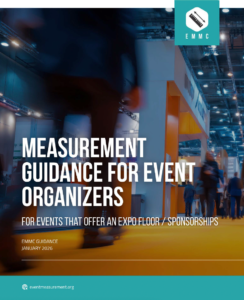

The use of AI is evolving at neck-breaking speed across every aspect of our lives, rapidly changing how we plan, work and even think. In trade shows, this evolution is also happening fast, with AI powering everything, from access to knowledge to agents that can be built with no coding skills. Here’s what we’re seeing right now, and what you can do to get ahead in the emerging zero-click economy.
Globally, 63 percent of companies indicate that they currently use standard AI tools (such as ChatGPT, Google Gemini, or similar) in at least some of their business functions, according to UFI’s Global Exhibition Barometer report released this month. Also, 17 percent have AI-powered tools integrated into their existing systems, and 3 percent have already developed proprietary algorithms trained on internal data. In parallel, 17 percent of respondents declare having no or almost no use of AI at this stage.
In terms of their level of maturity, most companies are still researching or testing solutions in the three domains surveyed:
- 72 percent towards “improving company and process efficiency”
- 68 percent towards “improving customer experience”
- 54 percent towards “generating revenues using AI-powered products”
“While AI is by now widely used across the industry, meaningful integration is still limited,” says Kai Hattendorf, former UFI CEO. “Tool-level adoption is widespread, while just a few companies have moved beyond basic use cases. But the shift from experimentation to adoption to AI-supported business models is starting to take shape, slowly, and unevenly across the many markets. A key challenge ahead will be the step from adoption to real transformation of business processes where it improves the industry’s products and services.”
Chatbots: Expert Knowledge at Lightning Speed
So how does this translate to AI adaptation on the ground? Over the past year, the industry is going deeper into GenAI for creative workflows and real-time event measurement. Custom chatbots are becoming more prevalent not just for customer service but also for deeper knowledge about specific subjects.
“I love how simple it is to build chatbots through custom or templated GPTs,” says Kaitland Hunter, executive creative director at Impact XM. One of the GPTs the company developed is The Creative Edge, a gamified AI learning experience, guiding users through creative and strategic challenges. “With some guardrails and pre-existing background documents, it’s incredible how useful it can be to form a training module or educational bot to help anywhere from onboarding employees to creating subject matter training to help us think differently.”
Genesis Exhibits recently launched Maestro, an AI-powered consulting solution designed to assist exhibitors in navigating the complexities of the trade show landscape. It’s trained using the company’s industry knowledge and real-time trade show marketing data from around the world.
Al Mercuro, strategic marketing and client engagement advisor at Genesis Exhibits, says: “It’s already quite good at estimating projects, however, one long-term goal, already in process, is to train it with additional, more detailed industry standards for design and manufacturing, further improving its ability to adjust concept renderings and generate deeper bills of materials (BOMs) for production purposes, faster and with far greater accuracy.”
AI Agents: The Quiet Superforce
One of the big draws at Salesforce’s Dreamforce 2024 was that attendees could build their first AI agent—a program that uses AI to autonomously perform tasks and pursue goals on behalf of users or systems—right there and then. Things are changing fast.
The difference between chatbots and agents is that chatbots respond to queries while agents take proactive actions to complete tasks with minimal human input.
Deloitte predicts that 25 percent of companies that use generative AI will launch Agentic AI pilots this year, growing to 50 percent in 2027.
“Right now, most trade show organizers are still focused on AI as a tool for personalization or automation, which is valid, but Agentic AI takes things a step further,” says Anca Platon Trifan, ceo of Tree-Fan Events Production, and host of the “Events Demystified” podcast. “Agentic AI introduces the possibility of autonomous, goal-oriented systems that can carry out tasks on your behalf without micromanagement.”
For the Summit, Platon Trifan’s team is building and testing several internal agents to support planning and production, such as a content support agent that manages speaker bios, intake forms, and session assets by compiling the info into a Notion database, flagging missing pieces, and prompting follow-ups. A workflow agent pulls form submissions, auto-generates email reminders, tracks confirmation status, and summarizes key points for speaker briefings. The team is also experimenting with a post-show agent that will take the final recordings and generate clips, blog outlines, social snippets, and recaps for each session, essentially helping the team publish faster with less manual effort. Introducing a public-facing AI assistant to help attendees navigate sessions in real time is the next step.
“Agentic AI has massive potential for our industry, not just in helping us do more, but in changing how we think about work,” says Platon Trifan. “The real power isn’t in flashy demos. It’s in those daily, boring, essential workflows that eat our time and energy. That’s where agents quietly shine.”
AI agents are already down on the showfloor. To help drive higher performance at trade shows, New York-based Augmented AI recently launched an agent-based marketing platform that can perform tasks ranging from lead prioritization, personalized follow-up messaging, synching insights into a CRM without any manual involvement, and precise campaign performance measurement.
Can I Build an Agent?
Building a basic agent might be easier than it seems, and in its simplest form, doesn’t require any coding skills.
During a recent presentation, EventMobi CEO Bob Vaez built an agent to call event registrants the night before the event to confirm participation and answer questions in under 10 minutes using Lindy. For trade shows and events, EventMobi’s built-in AI agents can automatically create sessions, update attendee records and automate attendee communications.
Platon Trifan builds and uses agents to support different areas of her work and life, ranging from keeping up with the AI news to tracking emerging events. She uses N8n, Deep AI, Anthropic Claude, and Google AI Studio, depending on the complexity and integrations required.
“I prioritize agents that connect seamlessly with the tools I already live in: Google Workspace, Notion, MailerLite, Slack, and WhatsApp. Integration is everything,” she says. “An agent that works in isolation might be ‘cool,’ but it’s not helpful if it doesn’t live where the rest of my systems do.”
To start exploring AI agents, the first step might be trying one of the pre-built agents released by most LLM. The next generation of AI-native browsers, such as Perplexity’s Comet and the upcoming browser by OpenAI, the creators of ChatGPT, are likely to push capabilities even further.
‘Out-humaning’ AI
We’re running a different kind of race now, against a runner much more powerful and faster than we are, says Hunter with Impact XM, “but this runner still can’t quite articulate how the pavement feels under their feet, and how the wind feels in their face.”
“We have the advantage of making sense of the world in a sensorial way that is so undeniably human,” she says. “It’s something I think we’ll see more of at in-person events in the future.
We’re going to need to be savvier about what’s been created by AI and what hasn’t. It’s going to sharpen (or soften) our storytelling, force us to elevate in-person interactions, and really consider what humans desire in any given moment. So yeah, I’m really excited to watch the humans win some races. It’s going to surprise all of us how we got there.”
Photos: Courtesy of Salesforce; Anna Huddleston
Related Topics:
- A Look Inside the AI Evolution at Trade Shows and Events This Year
- Coke Says its AI-Fueled Spiced Shop is a ‘Novel Way to Drive Trial’
The post From Chatbots to Agents and Beyond: How AI is Transforming Trade Shows in 2025 appeared first on Event Marketer.







